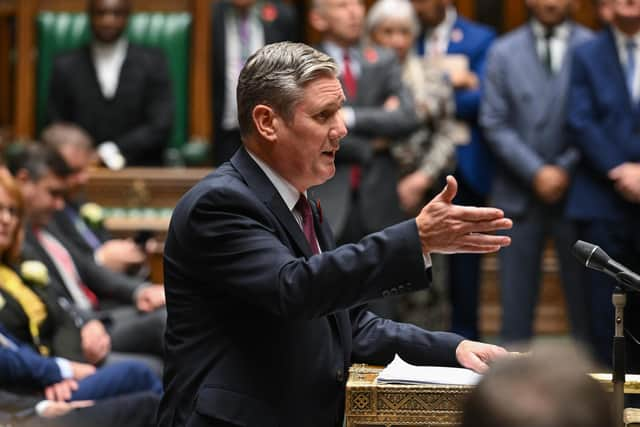Labour is a long way off winning hearts and minds of the electorate - Jayne Dowle
Would Labour be capable of effective government, particularly in response to major, potentially world-changing events requiring “moral judgements and fundamental political choices”?
Gaza, McDonnell argues, has been the most significant test to date on whether Labour is indeed “fit to govern”. Whilst it would be ignorant and disrespectful to discount the terrible events unfolding in the Middle East, it would also be slightly disingenuous to judge Labour chiefly on its ability to muster significant gravitas and sound judgement in what is such a testing global situation.
Advertisement
Hide AdAdvertisement
Hide AdYes, McDonnell, Labour MP for Hayes and Harlington in Essex, is right to signal alarm. In his view, Labour leader Sir Keir Starmer’s “lack of … experience may well have been the reason for [him] responding to the question of the legality of the blockade of Gaza in a way that caused such anxiety and anger”.


Such an established political operator as McDonnell is right to voice his disquiet. Yet, in the maelstrom of modern politics, it is far too easy for snap judgements to be made. Whilst Starmer wrestles with the challenge of commanding leadership without causing division over such a highly-charged situation in Gaza, we all need to keep looking forward and focussing on the bigger picture.
Let’s be honest. With a General Election on the horizon, and widely expected to happen some time next year, the Labour party still has a long way to go to make an impact on the hearts and minds of ordinary voters. Tying itself into knots over the situation in Israel and Gaza is one thing, reminding voters what they stand for in terms of major matters closer to home, such as the economy, the NHS, and education, quite another.
Interest rates remain stubbornly high, impacting on a cost of living crisis that refuses to budge. It's reported that around eight million people are waiting for NHS treatment, and waits in A&E are getting longer and longer as winter begins to bite and GP surgeries come under increasing pressure. Schools don’t have enough places, the university system is broken and teachers are still leaving the profession in droves.
Advertisement
Hide AdAdvertisement
Hide AdYet think for a moment. What can you remember from Labour’s annual conference in Liverpool back in September? Did a key speech stand out to you addressing your own personal concerns? Did you pick up themes and ideas that convinced you that voting a Labour government into power would deliver the necessary shot in the arm our beleaguered, exhausted country needs more than ever?
Starmer’s speech as leader was big on vision, light on delight. He was good at acknowledging the struggles ordinary people are facing, but in promising to deliver a “decade of national renewal” he sounded platitudinous at best.
We all know that the current government has left the country pretty bankrupt, both morally and in economic terms. Where the sheer cash was going to come from to deliver this promised “renewal” was not exactly outlined in detail.
Never renowned for his charisma, Starmer did at least seem to exude optimism. Unfortunately, cynicism runs pretty deep right now; we can be forgiven for asking where the money is likely to come from to fund such an ambitious aim.
Advertisement
Hide AdAdvertisement
Hide AdIn our region and across the North of England, the big issue is ‘levelling up’.
The difficulty for Labour is that voters are waiting to see how it proposes to tackle a notion that has never been properly delineated in the first place.
How can the party really come up with anything convincing when it’s operating not from a rock-solid foundation, but shifting sands?
To this end, strong words have been said about housing, for example, with deputy leader Angela Rayner promising that Labour would “achieve more on housing in six months than the Tories have in six years”.
Advertisement
Hide AdAdvertisement
Hide AdAgain, there’s the question of cash; if the proposed boost to social housing is to come to pass, it would involve significant investment.
Shadow net zero secretary and former party leader Ed Miliband, with his Doncaster North seat in the heart of South Yorkshire’s industrial belt, gave some sense of Labour’s vision behind GB Energy, which would break the stranglehold of private energy firms and expand the grid through local, renewable power networks, bringing cheaper bills and creating new jobs in carbon-friendly industries.
